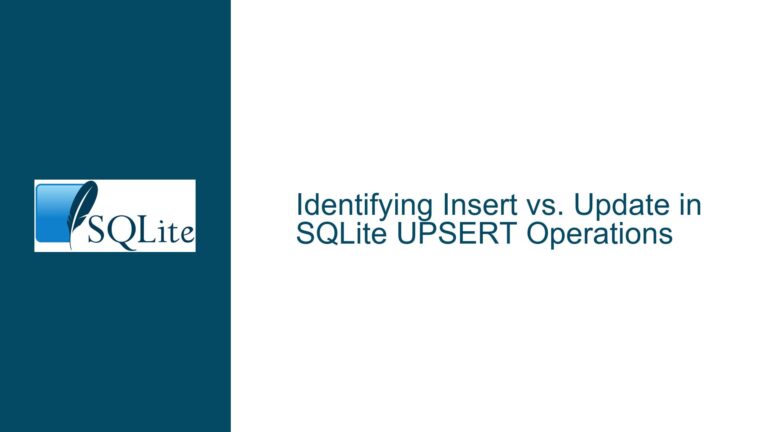Resolving Collisions Between SQLITE_CREATE_INDEX/CREATE_TABLE and SQLITE_DENY/IGNORE Constants in Authorization Callbacks
Issue Overview: Missing SQLITE_CREATE_TABLE/INDEX Authorization Events Due to Constant Overlap
When implementing an authorization callback using SQLite’s sqlite3_set_authorizer() mechanism through Python’s sqlite3 module, developers may encounter situations where expected authorization events for table and index creation operations fail to trigger. This manifests specifically as SQLITE_CREATE_TABLE (action code 2) and SQLITE_CREATE_INDEX (action code 1) not appearing in callback logs during schema modification operations, while unexpected SQLITE_DENY (code 1) and SQLITE_IGNORE (code 2) events appear instead.
The core conflict stems from integer value collisions between authorization action codes and result codes in SQLite’s C API constants. These collisions occur because:
- SQLITE_CREATE_INDEX (action code 1) shares its integer value with SQLITE_DENY (result code 1)
- SQLITE_CREATE_TABLE (action code 2) shares its integer value with SQLITE_IGNORE (result code 2)
When mapping numeric authorization codes to their symbolic names using a dictionary with integer keys, these collisions cause name aliasing – subsequent constants with duplicate integer values overwrite previous entries. This results in mislabeled authorization events where table/index creation attempts get incorrectly reported as DENY/IGNORE actions.
The confusion intensifies because temporary table creation (SQLITE_CREATE_TEMP_TABLE) and view creation (SQLITE_CREATE_VIEW) use distinct numeric codes that don’t collide with result constants, explaining why those operations trigger expected authorization events. This selective behavior creates an apparent inconsistency that obscures the underlying constant collision issue.
Possible Causes: Constant Namespace Collisions in SQLite Authorization Codes
1. Overlapping Integer Values in SQLite Constants
SQLite’s C API defines authorization action codes and callback result codes in separate namespaces that share numeric ranges:
Action Codes (Partial List):
- SQLITE_CREATE_INDEX = 1
- SQLITE_CREATE_TABLE = 2
- SQLITE_CREATE_TEMP_TABLE = 3
- SQLITE_CREATE_VIEW = 4
Result Codes (Partial List):
- SQLITE_DENY = 1
- SQLITE_IGNORE = 2
- SQLITE_OK = 0
When these constants get exposed through language bindings like Python’s sqlite3 module, they become part of a flat namespace where numeric collisions occur. A naive mapping strategy that assumes bijective (one-to-one) correspondence between integers and constant names will fail to capture these duplicates.
2. Dictionary-Based Constant Mapping Pitfalls
A common implementation pattern for working with SQLite authorization codes involves creating a reverse mapping from integer values to constant names using a dictionary:
CONSTANTS = {
getattr(sqlite3, c): c
for c in dir(sqlite3)
if c.startswith("SQLITE_") and isinstance(getattr(sqlite3, c), int)
}
This approach creates critical collisions because:
- Integer key
1gets assigned first toSQLITE_CREATE_INDEX, then overwritten bySQLITE_DENY - Integer key
2gets assigned first toSQLITE_CREATE_TABLE, then overwritten bySQLITE_IGNORE
The resulting dictionary contains only the last seen constant for each integer value, making it impossible to distinguish between action codes and result codes that share numeric values.
3. Authorization Callback Misinterpretation
SQLite’s authorization callback mechanism uses the same integer parameter to represent both:
- Action Code (what operation is being attempted)
- Result Code (what the callback returns to permit/deny)
When logging callback invocations, developers must differentiate between:
- Incoming action codes (describing attempted operations)
- Outgoing result codes (controlling operation allowance)
The constant collision causes action codes for CREATE_TABLE/INDEX to be mislabeled as DENY/IGNORE in logs, creating false indications that operations are being rejected rather than recorded.
Troubleshooting Steps & Solutions: Resolving Constant Collisions and Authorization Monitoring
1. Implement Collision-Aware Constant Mapping
Replace dictionary-based constant mapping with a list-of-tuples structure that preserves all (value, name) pairs:
from sqlite3 import *
SQLITE_CONSTANTS = [
(getattr(sqlite3, c), c)
for c in dir(sqlite3)
if c.startswith("SQLITE_") and isinstance(getattr(sqlite3, c), int)
]
def get_constant_names(value):
return [name for val, name in SQLITE_CONSTANTS if val == value]
When processing authorization callback parameters:
def authorizer_callback(action, *args):
action_names = get_constant_names(action)
print(f"Action: {action_names} ({action})")
return SQLITE_OK
This reveals all matching constant names for a given numeric value, allowing developers to see both action and result codes that share the same integer.
2. Differentiate Action Codes from Result Codes
Modify authorization callback handlers to explicitly separate:
Incoming Action Codes:
- Use numeric ranges to identify operation types
- SQLITE_CREATE_* codes range from 1 (SQLITE_CREATE_INDEX) to 29 (SQLITE_RECURSIVE)
Outgoing Result Codes:
- Standard SQLITE_OK (0), SQLITE_DENY (1), SQLITE_IGNORE (2)
Implement decision logic using numeric checks rather than constant names:
def authorizer_callback(action, arg1, arg2, dbname, source):
# Handle CREATE_TABLE action (code 2)
if action == 2: # SQLITE_CREATE_TABLE
print(f"Attempting to create table: {arg1}")
return SQLITE_OK
# Handle result codes from previous decisions
if action in (SQLITE_DENY, SQLITE_IGNORE):
handle_denied_operation(action, arg1, arg2)
return SQLITE_OK
3. Authorization Callback Implementation Best Practices
A. Action Code Filtering
Process specific action codes before handling general result codes:
AUTHORIZED_TABLES = {"allowed_table"}
def authorizer(action, arg1, arg2, dbname, source):
# Table creation authorization
if action == SQLITE_CREATE_TABLE:
return SQLITE_OK if arg1 in AUTHORIZED_TABLES else SQLITE_DENY
# Index creation authorization
if action == SQLITE_CREATE_INDEX:
log_index_creation(arg1, arg2)
return SQLITE_OK
# Default allow other actions
return SQLITE_OK
B. Collision-Safe Logging
Include both numeric codes and potential constant names in logs:
import sqlite3
def log_authorizer(action, arg1, arg2, dbname):
names = get_constant_names(action)
print(f"[{action}] {names} | DB: {dbname} | Object: {arg1} | Detail: {arg2}")
C. Schema Modification Tracking
To properly detect table/index creation despite constant collisions:
- Monitor
SQLITE_INSERToperations onsqlite_master:
INSERT INTO sqlite_master (type, name, tbl_name, rootpage, sql)
VALUES ('table', 'demo_table', 'demo_table', 2, 'CREATE TABLE demo_table(...)');
- Intercept
SQLITE_UPDATEoperations onsqlite_mastercolumns:
if action == SQLITE_UPDATE and arg1 == "sqlite_master":
handle_schema_change(arg2) # arg2 = column being modified
- Use
SQLITE_READevents onsqlite_masterto detect schema queries:
if action == SQLITE_READ and arg1 == "sqlite_master":
log_schema_access(arg2) # arg2 = column being read
4. Comprehensive Constant Mapping Table
Maintain a reference table of colliding SQLite constants:
| Integer Value | Potential Constants |
|---|---|
| 1 | SQLITE_CREATE_INDEX, SQLITE_DENY, SQLITE_ERROR |
| 2 | SQLITE_CREATE_TABLE, SQLITE_IGNORE, SQLITE_INTERNAL |
| 3 | SQLITE_CREATE_TEMP_TABLE, SQLITE_ABORT |
| 4 | SQLITE_CREATE_VIEW, SQLITE_LOCKED |
Use this table to interpret ambiguous numeric codes in authorization callbacks.
5. Unit Testing Strategies
A. Action Code Verification
Create test cases that validate constant mappings:
def test_constant_mapping():
assert SQLITE_CREATE_INDEX == 1
assert SQLITE_DENY == 1
assert get_constant_names(1) == ['SQLITE_CREATE_INDEX', 'SQLITE_DENY', ...]
assert SQLITE_CREATE_TABLE == 2
assert SQLITE_IGNORE == 2
assert get_constant_names(2) == ['SQLITE_CREATE_TABLE', 'SQLITE_IGNORE', ...]
B. Authorization Scenario Testing
Verify callback behavior with known schema operations:
def test_table_creation_authorization():
conn = sqlite3.connect(":memory:")
conn.set_authorizer(authorizer_callback)
# Should trigger SQLITE_CREATE_TABLE (code 2)
with pytest.raises(sqlite3.DatabaseError) as e:
conn.execute("CREATE TABLE test_table (id INTEGER)")
assert "SQLITE_CREATE_TABLE" in auth_log
assert "SQLITE_IGNORE" not in auth_log
6. SQLite Version-Specific Considerations
Be aware of authorization code changes across SQLite versions:
- SQLite 3.7.4 added SQLITE_CREATE_TEMP_TRIGGER (code 10)
- SQLite 3.31.0 added SQLITE_DROP_VIEW (code 26)
- SQLite 3.37.0 added SQLITE_CREATE_VIEW (code 4)
Maintain version-specific constant mappings when supporting multiple SQLite releases.
7. Cross-Language Implementation Notes
The constant collision problem manifests differently across programming languages:
Python:
sqlite3module exposes all constants at module level- Collisions require manual disambiguation
C/C++:
- Constants are preprocessor macros
- Compiler prevents direct value collisions
Node.js (better-sqlite3):
- Constants exposed via
sqlite3object - Similar collision risks to Python
Implement language-specific strategies for resolving constant ambiguities.
8. Performance Optimization Techniques
A. Authorization Callback Speed
Minimize callback overhead when processing frequent events:
- Use integer comparisons instead of string operations:
# Slow
if "CREATE_TABLE" in get_constant_names(action):
...
# Fast
if action == SQLITE_CREATE_TABLE:
...
- Cache authorization decisions for repeated operations
B. Selective Authorization Filtering
Only enable authorizer for required operations:
# Enable full authorization
conn.set_authorizer(full_authorizer)
# Disable when not needed
conn.set_authorizer(None)
9. Security Implications of Authorization Handling
A. SQLITE_DENY vs SQLITE_IGNORE
Understand security consequences of different result codes:
- SQLITE_DENY: Aborts current SQL statement with error
- SQLITE_IGNORE: Silently skips prohibited operation
- For
SQLITE_DELETE, ignores row deletion - For
SQLITE_INSERT, inserts NULL values
- For
B. Schema Modification Protection
To prevent unauthorized table/index creation:
def strict_authorizer(action, arg1, arg2, dbname, source):
if action in (SQLITE_CREATE_TABLE, SQLITE_CREATE_INDEX):
return SQLITE_DENY if dbname == "main" else SQLITE_OK
return SQLITE_OK
10. Advanced Debugging Techniques
A. SQLite Trace Integration
Combine authorizer with sqlite3_trace_v2() for comprehensive debugging:
def trace_callback(code, ctx, stmt, expanded):
print(f"Trace [{code}]: {expanded}")
conn.set_trace_callback(trace_callback)
B. Explain Query Plan Analysis
Use EXPLAIN to correlate authorization events with query steps:
cur = conn.execute("EXPLAIN CREATE TABLE debug_table (id INT)")
for row in cur:
print(row)
C. sqlite_master Inspection
Directly query schema changes after authorization events:
SELECT name, sql FROM sqlite_master
WHERE type IN ('table', 'index');
11. Permanent Resolution Strategies
A. Constant Namespace Isolation
Wrap SQLite constants in dedicated classes to prevent collisions:
class AuthActions:
CREATE_TABLE = sqlite3.SQLITE_CREATE_TABLE
CREATE_INDEX = sqlite3.SQLITE_CREATE_INDEX
class AuthResults:
DENY = sqlite3.SQLITE_DENY
IGNORE = sqlite3.SQLITE_IGNORE
B. SQLite Binding Customization
Recompile SQLite with modified constant values (advanced):
// sqlite3.c
#define SQLITE_CREATE_INDEX 1001
#define SQLITE_CREATE_TABLE 1002
C. Automated Collision Detection
Implement startup checks for constant conflicts:
def verify_constants():
conflicts = []
seen = {}
for c in dir(sqlite3):
if not c.startswith("SQLITE_"): continue
val = getattr(sqlite3, c)
if val in seen:
conflicts.append(f"{c} = {val} conflicts with {seen[val]}")
seen[val] = c
if conflicts:
raise RuntimeError(f"Constant conflicts:\n" + "\n".join(conflicts))
12. Historical Context and Design Rationale
Understanding SQLite’s constant assignment strategy helps prevent future collisions:
Action Code Numbering
Original authorization codes (1-23) were assigned sequentially in SQLite 3.0Result Code Reuse
SQLITE_DENY/IGNORE predate many authorization codes, leading to value overlapBackward Compatibility
Changing numeric values would break existing applications using magic numbers
This historical perspective explains why newer action codes (like SQLITE_CREATE_VIEW) were assigned higher numeric values to avoid collision with legacy result codes.
13. Cross-Database Authorization Comparison
Contrast SQLite’s approach with other database systems:
PostgreSQL GRANT/REVOKE:
- Role-based privilege system
- No callback mechanism equivalent
- Schema permissions stored in system catalogs
MySQL Authorization Plugins:
- Pluggable authentication architecture
- Stored procedures for access control
- No direct equivalent to SQLite’s runtime authorizer
SQL Server Code Signing:
- Certificate-based stored procedure permissions
- Lacks fine-grained per-operation callbacks
These comparisons highlight SQLite’s unique combination of lightweight design and runtime authorization flexibility.
14. Long-Term Maintenance Strategies
A. Documentation Practices
Maintain internal documentation mapping authorization codes:
| Code | Constants | Introduced |
|------|------------------------------------|------------|
| 1 | CREATE_INDEX, DENY | SQLite 2.0 |
| 2 | CREATE_TABLE, IGNORE | SQLite 2.0 |
| 3 | CREATE_TEMP_TABLE, ABORT | SQLite 3.0 |
B. Automated Code Generation
Use SQLite’s sqlite3.h header to generate constant mappings:
# Parse SQLite C header
with open("sqlite3.h") as f:
for line in f:
if "#define SQLITE_" in line:
# Extract constant definitions
C. Continuous Integration Checks
Implement automated testing for authorization callback behavior:
# GitHub Actions Example
jobs:
auth-tests:
runs-on: ubuntu-latest
steps:
- name: Test Schema Authorization
run: |
python -m pytest tests/test_authorizer.py -v
15. Conclusion and Final Recommendations
To reliably handle SQLITE_CREATE_TABLE/INDEX authorization events:
Use Multi-Value Constant Mapping
Always resolve numeric codes to all possible constant namesImplement Action Code Filtering
Check for specific numeric values before handling general resultsMaintain Constant Collision Awareness
Document and test for overlapping authorization codesCombine Authorization with Tracing
Use SQLITE_TRACE_STMT with authorizer for full operation visibilityAdopt Defensive Programming Practices
Validate expected constant values at application startup
By following these guidelines, developers can accurately monitor schema modifications through SQLite’s authorization callback mechanism while avoiding pitfalls caused by overlapping constant values.






